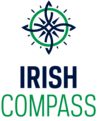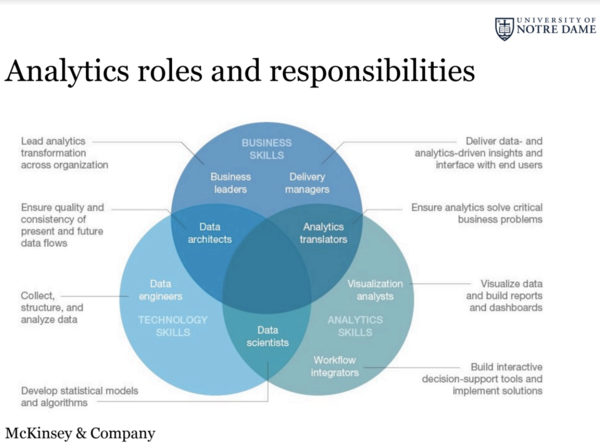Analytics

Analytics
It’s important to realize that Analytics is better categorized as a function or job role rather than an industry unto itself. The field is expanding quickly and there are some companies that focus on analytics specifically, but the majority of the posted roles are with companies that likely fit into broader industry categories - technology, consumer goods, consulting, manufacturing, etc. As such, candidates must ask themselves a couple questions - (1) what type of analytics work am I interested in, and (2) who’s data do I wish to work with?
Refer to the featured graphic under Online Resources to help with the first question. The field connects three skill sets - business, technology, and statistics. Depending on the candidate’s personal skill level and experience, he or she might find certain roles are a better fit than others. As for the second question, analytics roles can be found within a growing number of major companies that spend time and money collecting huge amounts of data and need analytics professionals to translate findings into actionable strategies. This can be both exciting and overwhelming to candidates since the volume of opportunities is high, but the process of narrowing their search is more complex and time consuming. Answering question one to narrow the scope of positions will be helpful, and then thinking about the products or services analyzed will refine the search even further (question 2).
Job Title Examples:
- Data Analyst / Product Analyst
- Data Scientist
- Data Engineer
- Data Architect
- Business Analyst
- Visualization Analyst
Skills Needed:
- Critical & Analytical Thinking
- Teamwork
- Intellectual Curiosity
- Communication
- Knowledge of Programming Languages
- Examples include: R, RStudio, SQL, Python, SPSS, SAS, Excel, Machine Learning, Java, PowerBI, Tableau, C++, etc.
Further Education/Training:
- Most entry level roles welcome new graduates who’ve pursued some sort of technical major.
-
Some companies target specific majors to apply to their jobs. Some of these are:
- ACMS / Statistics
- Computer Science
- Business Analytics
- Economics
- Chemical Engineering
- Mathematics
- High level of position variability - specific to certain technical skills
- High ceiling for advanced training or degrees - plenty of Masters & PhD programs and job opportunities for interested students
Find Opportunities

Using IrishCompass, LinkedIn, and ND’s alumni association directory called myND is the best way to start on the networking front.
Job Databases:
- Handshake - campus recruiting pathways
- LinkedIn Jobs
- CareerShift
- DataJobs
- Digital Analytics Association
For more organizations that hire data analytics talent, click here.
If you choose to pursue data-focused roles, networking is critical in finding opportunities. It is appropriate and common to ask for referrals for any students interested in gaining employment in the Big Tech space.
Industry Timeline
As a field, Analytics is still growing and adapting to a structured pattern of job titles and descriptions. The demand is very high for candidates with technical skills related to data, but there is little uniformity in specific skills related to specific titles. Put another way, a Data Analyst position with Company X could be quite different from a Data Analyst position with Company Y. Candidates should plan to spend time reading and researching positions and companies to find a fit for their skills and goals.
In terms of a timeline, positions will be posted year round. There will be an emphasis on hiring in the fall for employers who ascribe to the campus recruiting timeline similar to consulting and other business services, but many companies will be hiring when the need presents itself. Candidates should plan to engage with companies of interest early in the process to learn about the specifics of their data-focused roles and the typical hiring timeline.
Lastly, candidates seeking analytics opportunities should also plan to seek positions in and out of the university- or campus-centered model. Meaning, posted positions are likely seeking candidates both from university campuses and experienced, working professionals. As a university candidate, your value will be a combination of an early engagement with analytics via academic channels and a high ceiling for growth via projects, internships and continued intellectual curiosity.
Applying and Interviewing
Resumes
Your resume will often be the first impression for a potential employer. You want to make sure that your resume is concise, direct, and specific. Ensure that your resume is tailored for the position and for the industry. Highlight relevant technical skills both in the “Skills” section as well as in each experience (project, internship, extracurricular, etc.) where a skill was used. Employers will be seeking particular skills (i.e., coding languages, software, and visualization tools) and examples of your experience using them. Review our guide on resumes for more information on how to construct one.
Cover Letters
A cover letter introduces you to a potential employer. Use the position description to make specific connections between your skills and experience and what the organization is looking for in a candidate. The cover letter should be concise and well-written—if a potential employer reads your cover letter and is intrigued, they will then read your resume. Your cover letter should not repeat your resume verbatim, but enhance it. Take the opportunity to add more detail or context to experiences on your resume that are most relevant - these are likely the experiences you’d plan to discuss in your interview. Together the cover letter and resume can help land you an interview. Review our guide on cover letters for more information on how to construct one.
Interviewing
Most interviews will contain a mixture of resume based questions (questions about your past experience) and behavioral based questions (your ability to handle prospective situations at work). Most positions will begin with an interview that has a mix of these questions. Review our guide on common interview questions.
It’s also important to be aware that for a technical field, some sort of technical assessment may be involved. For some employers, this could be an online assessment sent immediately following application submission to gauge your skill level. For others, it could mean a technical interview where you’re asked to either explain a project in minute detail or show your skills in a basic problem solving session.
Preparation is extremely important for interviews. Research the company/organization, current and previous projects they’ve worked on, and even the people that you’re interviewing with. Knowing the differences between the type of company and analytics position with which you are interviewing versus others is also extremely beneficial. This will not only help provide talking points but will show your knowledge and genuine interest in the position. Utilize our resources on how to best prepare yourself to excel in your interview.
Online Resources

- Kaggle
- DataJobs
- Discover Data Science
- Cracking the Coding Interview (LinkedIn article)
- Alison
- LinkedIn Learning
- Interview Query
- LeetCode
- Towards Data Science
- Data Science Jay
- Coursera
- Udemy
- Data.gov
Campus Resources
Career Counselor:

Sara Iannone,
Assistant Director, Consulting & Data Science/Analytics
Student Clubs:
Employer Examples:
- Amazon
- 84.51°
- McKinsey Digital
- Stryker
- Civis Analytics
Join Handshake:
Personalize your feed, explore your curiosities, and get updates that matter to you. Handshake is a dynamic system that works to match students with the most relevant resources and opportunities offered by our office including:
• Access to personalized job recommendations – This is based on major, career interests, and profile information such as skills and experiences. When students fill out their profile, they’ll be able to see jobs and internships that match their interests and skills.
• Ability to schedule one–on-one counseling appointments – Counseling appointments are able to be scheduled through Handshake and held virtually via Zoom.
• Ability to interact with employers – Students can research contact information for local and national employers. Employers can also message students with opportunities and information.
• Connect with students across the country - Students can interact with their peers through messaging, get tips and advice, as well as network.
• Search for and apply to open positions - On Handshake, students can see jobs and internships posted specifically for them as well as employers actively recruiting from Notre Dame.